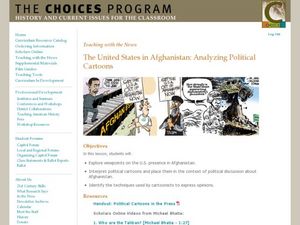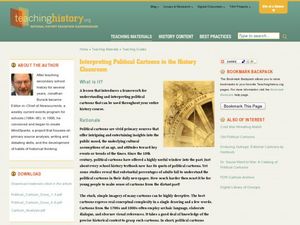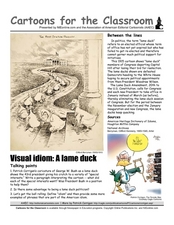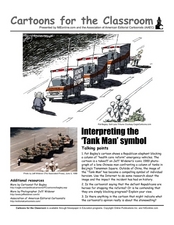Curated OER
Political Cartoons
Students examine a variety of historical cartoons. They recognize a political cartoon and identify the main idea, symbolism, exaggeration and caricature in political cartoons. Students analyze a political cartoon by Benjamin Franklin.
Curated OER
The U.S. in Afghanistan: Analyzing Political Cartoons
Students take a closer look at the U.S. presence in Afghanistan. In this global issues instructional activity, students analyze political cartoons related to the War on Terror. Students discuss their impressions of the war and then...
Curated OER
Interpreting Political Cartoons in the History Classroom
Students analyze political cartoons. For this historical perspectives lesson, students use the provided cartoon analysis worksheet to examine the political cartoons that their instructor shares with them.
Curated OER
Cartoons for the Classroom: China, Tibet, and the Olympics
Political tensions have surrounded the Olympics for centuries; take a look back at the 2008 Beijing Summer Olympics with this political cartoon analysis activity. Background information gives learners context regarding Tibetan protests...
Curated OER
Cartoons for The Classroom: Lame Duck Congress
Clear up "lame duck" congressional confusion with this political cartoon analysis worksheet. Background information on the concept's history and current use is provided, and 2 cartoons give a past and present context. Three talking...
Curated OER
Political Cartoons
Middle schoolers analyze and interpret political cartoons, then use this knowledge to create their own.
Curated OER
Cartoons for the Classroom: Interpreting the "Tank Man" Symbol
The iconic image of the Tank Man is imitated in this political cartoon analysis, in which learners examine a cartoon depicting a similar standoff. The original image is pictured, and learners compare it to a more modern cartoon of the...
Curated OER
Cartoons in the Classroom: The Stimulus Package
A large pig labeled "Stimulus Package" wrapped in an American flag is the primary image on this political cartoon. Ready for analysis, this worksheet provides learners with the opportunity to understand the pros and cons of US spending...
Eastconn
Learning to Analyze Political Cartoons with Lincoln as a Case Study
Discover the five main elements political cartoonists use—symbolism, captioning and labels, analogy, irony, and exaggeration—to convey their point of view.
Curated OER
Interpreting Political Cartoons - "Roaring" 20s
Eleventh graders investigate 1920's America. In this political cartoon lesson, 11th graders interpret political cartoons from the 1920's and respond to the provided analysis questions that accompany the cartoons.
Curated OER
Political Cartoons
Students explore political cartoons. In this government current events lesson, students analyze the visual language and symbolism present in five different political cartoons. Students discuss the event or issue that inspired the...
Curated OER
Drawing Political Cartoons
Students draw political cartoons. In this editorial cartoons lesson, students discover the history of the cartoons in America, analyze some cartoons, and then draw their own cartoons that make social statements.
Humanities Texas
Primary Source Worksheet: Grant E. Hamilton, “I Rather Like That Imported Affair”
Political cartoons are primary source documents and learning to read them can be a challenge. Challenge the reading skills of your class with a political cartoon featuring rough and ready, Teddy Roosevelt.
Curated OER
Interpreting Political Cartoons – Vietnam Era
Eleventh graders explore opinions regarding U.S. involvement in Vietnam. In this primary source analysis lesson plan, 11th graders analyze political cartoons related to the Vietnam War and then respond to the provided discussion questions.
Curated OER
Interpreting Political Cartoons
Students review political cartoons and discuss what political impact they can have. They choose a current political cartoon and write an essay exploring its intent and impact.
Curated OER
Alexander Hamilton and the Roots of Federalism
Explore the origin of political parties in the United States. Learners work in groups to read and analyze copies of the "Report on Manufactures" written by Alexander Hamilton. Then, they complete a worksheet comparing the Federalists to...
Curated OER
Cartoons for the Classroom: Learning to Interpret a Convention
In this current events instructional activity, students analyze political cartoons about political conventions. Students respond to 4 talking point questions.
Curated OER
The Political Dr. Seuss
High schoolers discuss the role political cartoons have played in U.S. politics and public affairs since the 1700's. They analyze some of the political cartoons Dr. Seuss drew during World War II and discuss how these cartoons conveyed...
Curated OER
Cartoons for the Classroom: Defining the Separation of Power
In this current events worksheet, students analyze a political cartoon about the separation of powers in the American government and respond to 3 talking point questions.
Curated OER
Cartoons for the Classroom: Don't Get It? You're Not Alone
In this historical events instructional activity, learners analyze a political cartoon from the 1700's and one from the 1900's . Students respond to 2 short answer questions.
Curated OER
Cartoons for the Classroom: The Many Faces of Uncle Sam
In this historical events activity, students analyze political cartoons featuring the different faces of Uncle Sam. Students respond to 5 talking point questions.
Curated OER
Cartoons for the Classroom: Visual Idiom, A Lame Duck
For this current events worksheet, students analyze a political cartoon about lame duck sessions and respond to 3 talking point questions.
Curated OER
Cartoons for the Classroom: The Bonds Asterisk
In this current events worksheet, students analyze a political cartoon about Barry Bonds and respond to 3 talking point questions.
Curated OER
Cartoons for the Classroom: Tooning into the Candidates, Hillary Clinton
For this current events worksheet, students analyze a political cartoon about Hillary Clinton and respond to 3 talking point questions.

























